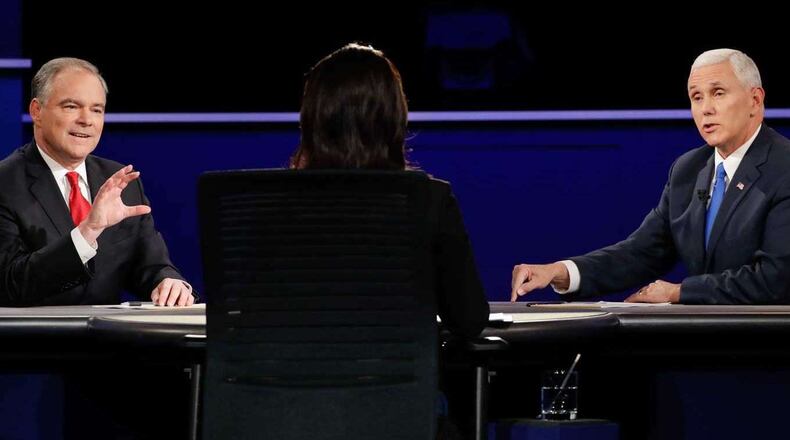The single most striking thing about last night's vice presidential debate between Mike Pence and Tim Kaine?
Time and again, when pushed to defend the ongoing, repeated rantings of his boss, Donald Trump, Pence walked away, choosing not to even make the attempt. His most effective technique -- and it wasn't effective at all -- was to try to deny that Trump had said and done what most of America has witnessed him saying and doing. Like a growing number of American voters, Trump's own running mate recognizes the indefensible when he sees it. As Democratic veep nominee Tim Kaine, noted last night, “He's refused to defend his running mate. . .and yet, he's asking everybody to vote for somebody that he cannot defend."
That's exactly right.
I suspect that in many eyes, Pence benefited personally from the stark contrast with Trump, leaving at least some Republican voters with a degree of buyer's remorse. Where Trump blusters and rants, Pence calmly explains. Where Trump sees the world exclusively in terms of his own self-aggrandizement, Pence can be humble and patient. Whatever his other failings, Pence knows the issues and is comfortable discussing them. On those occasions when he wasn't gingerly stepping through a field of mines left behind by Trump, he held his own and sometimes more against Kaine.
Kaine, on the other hand, rose quickly and often to the defense of Hillary Clinton -- sometimes too quickly and often. And if he didn't leave many Democrats dreaming about "Kaine for President" bumper stickers, the Clinton campaign was probably happy with his performance nonetheless. His role was to push the argument that Trump is not a rational choice as commander in chief and president, and in that he succeeded.
It's also worth noting that Pence, a former 12-year congressman with strong ties to the D.C. establishment, is precisely the kind of candidate that Republican voters rejected in the primaries. His own Indiana voters rank him a mediocre governor by national standards, and his bungling of the so-called religious liberty bill last year alienated those on the right as well as the left. When he eagerly accepted Trump's offer last summer, he did so facing a very tough fight for re-election even in a conservative state such as Indiana.
Furthermore, the degree of influence that Pence would have in a Trump administration can be gauged by the degree of influence that he wields in the campaign, which by all accounts and evidence is zero. In a cult of personality, which is what the Republican Party has devolved into, there is no No. 2. There is only No. 1, and nobody else really matters.
Finally, last night's debate only began to reveal Pence's extreme personal record on gay rights and abortion, in which he as even gone so far as to sign a bill requiring funerals and burial for miscarriages and abortions as a way to dramatize the notion that "human life begins at conception." (The courts quickly overturned it.) In Congress he fought every legislative effort, first under President Bush and later under President Obama, to try to mitigate the 2008 financial collapse, a stance that most economists, conservative as well as liberal, say would have compounded the crisis had it proved successful. And he was a stalwart defender of the Bush administration's Iraq policy, from start to finish.
In short, Pence last night gave us an accurate example of what the pre-Trump Republican Party used to be, and while in hindsight that might look good to some, it is only in contrast to what the party has now become.
About the Author
The Latest
Featured



